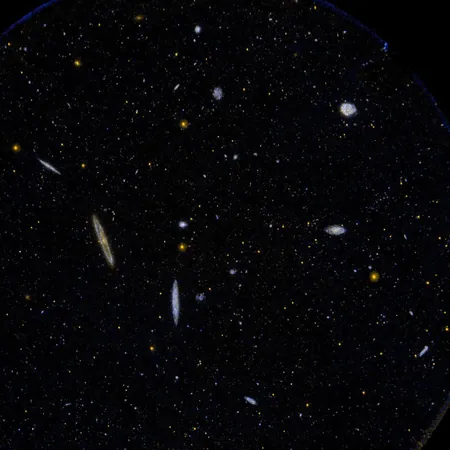
Are We On the Brink of a Physics Revolution? Groundbreaking Discoveries Challenge Our Understanding of the Universe!
2024-09-23
A startling new discovery is making waves in the realm of physics, reigniting the discussion among experts about potential revisions to our foundational understanding of the universe. A collaborative study from Southern Methodist University (SMU) along with three other prestigious institutions is suggesting we may need to rethink the fundamental concepts that have shaped physics education worldwide.
The researchers utilized the institution's advanced high-performance computing facilities to delve deeper into anomalies revealed by the Dark Energy Spectroscopic Instrument (DESI), a groundbreaking tool that is crafting the most comprehensive 3D map of the universe we've ever seen. "The data we've gathered from DESI, combined with existing information, provides an unprecedented level of precision, and the implications are quite unexpected," remarked Joel Meyers, a co-author of the study and associate professor at SMU.
The Shocking Findings of DESI
The DESI project is not just an astronomical endeavor; it has significant implications for our understanding of cosmic phenomena. One of its significant contributions is providing vital measurements that allow cosmologists to determine the absolute mass scale of neutrinos, elusive particles that play a critical role in shaping the universe.
This absolute mass scale has been derived from new observations concerning baryonic acoustic oscillations identified by DESI, in tandem with data from the cosmic microwave background—the afterglow remnants of the Big Bang. Neutrinos are some of the universe's most plentiful particles, and studying their mass can yield insights into how matter gathered and evolved over billions of years.
Interestingly, while cosmologists long believed that heavy neutrinos would suppress matter clustering—essentially keeping galaxies from gravitating too close together—the latest DESI findings reveal the opposite: an enhancement of matter clustering. "The data suggests that matter in the cosmos is more densely packed than previously assumed," Meyers explained.
Implications of These Findings
This unexpected surge in clustering raises a crucial question: Could there be flaws in current measurements, or does this signal a need for revised physics beyond the established Standard Model? The Standard Model has been the cornerstone of particle physics, educating generations of students on how fundamental particles interact; however, new findings like this could challenge its long-standing doctrines.
The researchers are currently exploring various scenarios that might explain this anomaly without discarding the Standard Model completely. They are considering introducing new physics principles altogether, as well as investigating potential systematic measurement errors that could account for these surprising results.
While the path to gaining clarity on these observations may take years, this research serves as a pivotal guidepost for future explorations. As we stand on the precipice of potentially transformative revelations, the implications not only affect theoretical physics but also promise to reshape how the universe is taught in classrooms across the globe.
This discovery invites us all to ponder: Are we truly on the verge of redefining our cosmic framework? Only time will tell, but one thing is certain—science is about to embark on a thrilling new chapter!



 Brasil (PT)
Brasil (PT)
 Canada (EN)
Canada (EN)
 Chile (ES)
Chile (ES)
 España (ES)
España (ES)
 France (FR)
France (FR)
 Hong Kong (EN)
Hong Kong (EN)
 Italia (IT)
Italia (IT)
 日本 (JA)
日本 (JA)
 Magyarország (HU)
Magyarország (HU)
 Norge (NO)
Norge (NO)
 Polska (PL)
Polska (PL)
 Schweiz (DE)
Schweiz (DE)
 Singapore (EN)
Singapore (EN)
 Sverige (SV)
Sverige (SV)
 Suomi (FI)
Suomi (FI)
 Türkiye (TR)
Türkiye (TR)